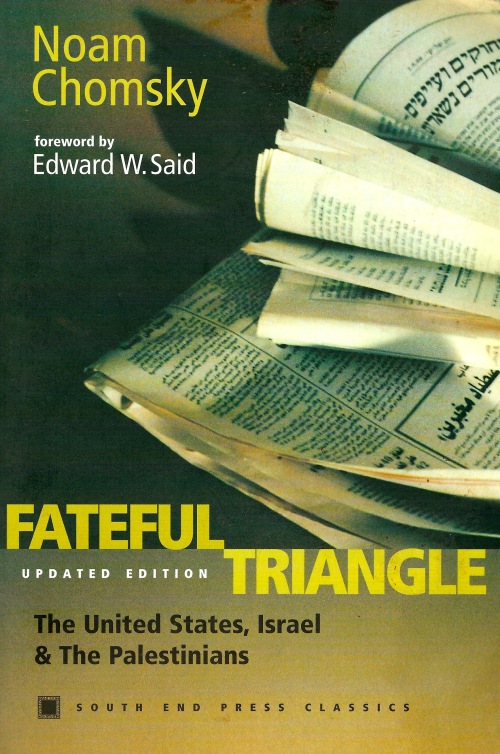1.
My idea of the ideal text is still the Talmud. I love the idea of parallel texts, with long, discursive footnotes and marginal commentary, texts commenting on texts.
–Noam Chomsky, Mother Jones interview, 1987
2.
Text from Noam Chomsky, The Fateful Triangle: The United States, Israel, and the Palestinians, p. 386 (South End Press, 1983):
[On the Sabra-Shatila massacres] There was also a reaction from Elie Wiesel, who is much revered internationally and in the United States for his writings on the Holocaust and on moral standards and has been proposed many times for the Nobel Peace Prize for these writings, again for 1983, by half the members of Congress according to the secretary of the Norwegian Nobel Committee.*
The footnote:
*In 1983, Wiesel was awarded the 1983 International Literary Prize for Peace in Liege, Belgium, perhaps in recognition of his observations through 1982 on Israel’s policies in the occupied territories and in Lebanon. Boston Globe, April 24, 1983. He was selected as chairman of the Holocaust memorial, “as the only one person of sufficient stature.” In his speech at the April 1983 gathering of Holocaust survivors, he emphasized support for Israel in the face of military and “political” threats. Washington Post, April 12, 13, 1983. Wolf Blitzer comments from Washington in the Jerusalem Post (April 15, 1983) that the organizers “were always careful, in their public statements, to characterize it as a non-political event. But from the start, those involved in the operation fully recognized the automatic political spinoff for Israel…Israeli officials and sympathetic American Jewish political activists agreed that raising public awareness of the Holocaust…was bound to generate heightened sympathy and support for Israel. Only the most fanatically pro-Arab and anti-Israel advocates could fail to appreciate the relationship.” The organizers chose a low-keyed approach; they “did not have to use a sledgehammer to press their point for strong U.S. backing for Israel…Thus, without much advertisement or fanfare, Isrel’s cause automatically received a major boost. Israeli diplomats were very well aware of the fact.” He goes on to explain how U.S. government officials “hesitated” to criticize Israel and “its West Bank settlement policy” because of the Holocaust gaterhing, joining Wiesel in their silence. Recall Nahum Goldman’s remarks on exploitation of the Holocaust for political ends, an act of “sacrilege.” See p. 98.
Text from p. 98:
As for Nahum Goldmann, he became President of the World Zionist Organization from 1956 to 1968 but remained critical of Israel’s diplomacy, including its entry into the Cold War system on the side of the U.S. and its post-1967 rejectionism. He was also critical of the tactic of converting the Holocaust into a device to justify atrocities and murder. At the beginning of the Jewish New Year, in October 1981, he wrote:
We will have to understand that Jewish suffering during the
Holocaust no longer will serve as a protection, and we
certainly must refrain from using the argument of the
Holocaust to justify whatever we may do. To use the
Holocaust as an excuse for the bombing of Lebanon, for
instance, as Menachem Begin does, is a kind of “Hillul
Hashem” [sacrilege], a banalization of the sacred tragedy of
the Shoah [Holocaust], which must not be misused to justify
politically doubtful and morally indefensible policies.24
3.
From Edward W. Said’s Foreword to the 1999 updated edition, Fateful Triangle, p. vii:
There is something profoundly moving about a mind of such noble ideals repeatedly stirred on behalf of human suffering and injustice. One thinks here of Voltaire, of Benda, or Russell, although more than any one of them, Chomsky commands what he calls “reality” — facts — over a breathtaking range. Fateful Triangle can be read as a protracted war between fact and a series of myths — Israeli democracy, Israeli purity of arms, the benign occupation, no racism against Arabs in Israel, Palestinian terrorism, peace for Galilee. Having rehearsed the “official” narrative, he then blows it away with vast amounts of counter-evidence.
4.
I read Chomsky’s footnote in 1986 and so realized another way of regarding Elie Wiesel. In 2001 I published a book that evolved out of that footnote, Elie Wiesel and the Politics of Moral Leadership (Temple University Press).
